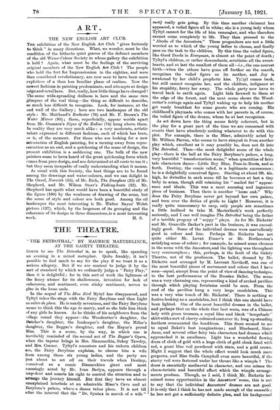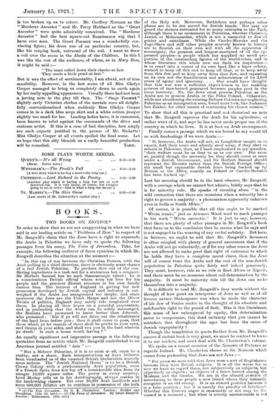THE THEATRE.
" THE BETROTHAL," BY MAURICE MAETERLINCK, AT THE GAIETY THEATRE.
GOING to see The Betrothal is, so to speak, like spending an evening in a mixed metaphor. Quite frankly, it isn't possible to find much to say for the play if we treat it as a serious allegory. But if we are content to judge it by the sort of standard by which we ordinarily judge a " Fairy Play," then it is delightful ; for in this sort of work the lightness of the fancy atones for its shallowness, invention for lack of coherence, and sentiment, even sticky sentiment, serves to glue in the loose ends.
In the sequel of The Blue Bird Mytyl has disappeared, and Tyltyl takes the stage with the Fairy Berylune and then Light as valets de place. He is nearly seventeen, and the Fairy Berylune seems to think this the age to marry, and so she bids him think of any girls he knows. As he thinks of his neighbours from the village round they appear—the Woodcutter's daughter, the Butcher's daughter, the Innkeeper's daughter, the Miller's daughter, the Beggar's daughter, and the Mayor's proud Miss. This is a scene, by the way, in which one is inevitably reminded of the second act of The Beggar's Opera, when the tapster brings in Mrs. Slammerkin, Sukey Tawdry, and Mrs. Coaxer. Tyltyl's ancestors and his unborn children are, the Fairy Berylune explains, to choose him a wife from among these six young ladies, and the party are just about to set off on their travels when Destiny, conceived as a comic Bismarekian giant and most amusingly acted by Mr. Ivan Berlyn, appears through a trap-door and asserts his right to control the situation and to arrange the journey himself. But first they have an almost unexplained interlude at an admirable Miser's Cave and at Berylune's palace, where a dance takes place. It is not till after the interval that the " Dr. Syntax in search of a wife " motif really gets going. By this time another claimant has appeared, a veiled figure all in white; she is a young lady whom Tyltyl cannot for the life of him remember, and who therefore cannot come completely to life. They then proceed to the " Abode of the Ancestors." These progenitors are not a little worried as to which of the young ladies to choose, and finally pass on the task to the children. By this time the veiled figure, like Good Deeds in Everyman, is almost at the point of death ; Tyltyl's children, or rather descendants, scrutinize all the sweet- hearts, and at last the smallest of them all—i.e., the one nearest birth—when the others have gone off further on the search, recognizes the veiled figure as its mother, and Joy is awakened by her child's prophetic kiss. Tyltyl comes back, but still cannot recognize her, and the children, indignant at his stupidity, hurry her away. The whole party now have to travel back to earth again. Light bids farewell to them at the edge of the forest, and the next scene shows the Wood- cutter's cottage again and Tyltyl waking up to help his mother get ready breakfast for some guests who are coming. His childhood's playmate who comes with her parents is, of course, the veiled figure of the dream, whom he at last recognizes.
As set down here the thing seems fairly coherent, but in the play for a great part of the time we are concerned with events that have absolutely nothing whatever to do with this plot. For example, there is the Miser, admirably acted by Mr. William Farren, who seems to have strayed in from another play which, excellent as it may possibly be, does not fit into The Betrothal. Then—the most delightful scene of the whole play—there is the ball at the Fairy Berylune's palace, a long, very beautiful " transformation scene," when quantities of fairy tale characters dance—Little Boy Blue, Puss-in-Boots, and so forth. Destiny, the comic relief, is a legitimate excrescence ; he is a delightfully conceived figure. Starting at about 9ft. 4in. high, he dwindles in each scene till he becomes at last a tiny baby in arms, though still retaining his " mailed fist " appear- ance and ideals. This was a most amusing and ingenious piece of business. Then there is another " loose end." Why does the Fairy Berylune never get beyond her own palace, and turn over the duties of guide to Light ? However, it is really quite unnecessary to carp, only people are sometimes a little inclined to take M. Maeterlinck's work perfectly seriously, and I can well imagine The Betrothal being the father of a terrible progeny of " soppy " plays. As for Mr. Ricketts' and Mr. Granville Barker's part in the business, it was exceed- ingly good. Some of the individual dresses were marvellously good in colour and line. Perhaps Mr. Ricketts has not quite either Mr. Lovat Fraser's or Mr. Rutherston's satisfying sense of colour ; for example, he missed some chances in the scene with the Ancestors, and the lighting was throughout very commonplace ; this, perhaps, is the fault of the Gaiety Theatre, not of the producers. The ballet, dressed by Mr. Ricketts and arranged by M. Laurent Novikoff, was one of the most beautiful pieces of movement and colour that I have seen—equal, except from the point of view of dancing technique, to the best performances of the Russian Ballet. The scene was a very charming one, representing a kind of arched pavilion through which playing fountains could be seen. From the roof of the pavilion hung a very large candelabra. This was a very wise touch of Mr. Ricketts'. There is nothing so festive-looking as a candelabra, but I think this one should have been lighted. One of the most beautiful dresses in the ballet, and perhaps that on the whole that best worn, was of a Chinese lady with green trousers, a royal blue and black "lampshade" skirtwitha sort of cherry-coloured coat over it; long up-standing feathers ornamented the headdress. This dress seemed to me to equal Bakst's best imaginations ; and Bluebeard, Sister Anne, and several other fairy tale characters had dresses which approached it in excellence. Light has a wonderful flowing dress of cloth of gold with a huge cloth of gold cloak lined with red, a great blue veil powdered with stars, and a gold crown. Might I suggest that the whole effect would look much more gorgeous, and Miss Stella Campbell even more beautiful, if the starry veil were fastened under her throat like a wimple ? The dress is essentially mediaeval in character, and one misses the characteristic and beautiful effect which the wimple arrange- ments produce. Though, as I said, I think Mr. Ricketts has missed some opportunities in the Ancestors' scene, this is not to say that the individual Ancestors' dresses are not good. It is only that I think he has not made enough of the ensemble; he has not got a sufficiently definite plan, and his background
Is too broken up as to colour. Mr. Geoffrey Norman as the " Murderer Ancestor " and Mr. Percy Hubbard as the " Great Ancestor ". were quite admirably conceived. The " Murderer Ancestor ". had the best square-cut Renaissance wig that I have ever seen. The Great Peasant was a wonderfully con- vincing figure; his dress was. of no particular country, but, like his reaping hook, universal of the soil. I want to draw a veil over the scene in the Abode of the Children. In this I was like the rest of. the audience, of whom, as in Mary Ross, it might be said :— " The tears rolled down their cheeks so fast
They made a little pond at last."
But it was theeffect of sentimentality, I am afraid, not of true sensibility. However, in the last scene of all Miss Gladys Cooper managed to bring us completely down to earth again by her really appalling appearance. Visually there had not been a jarring note in the play till then. The "Stage Peasant" slightly. early Victorian clothes of the mortals were all delight. fully ..,-conventionalized when suddenly Miss Gladys Cooper comes in in a dark blue serge skirt and a white cotton jumper slightly too small for her. Leading ladies have, it is rumoured, been known to rebel against the commands of the decor and costume artist. If this is a case of bad discipline, how amply are such experts justified in the person of Mr. Ricketts ! Miss Gladys Cooper at all events spoiled the final scene. Let us hope that this silly blemish on a really beautiful production































 Previous page
Previous page